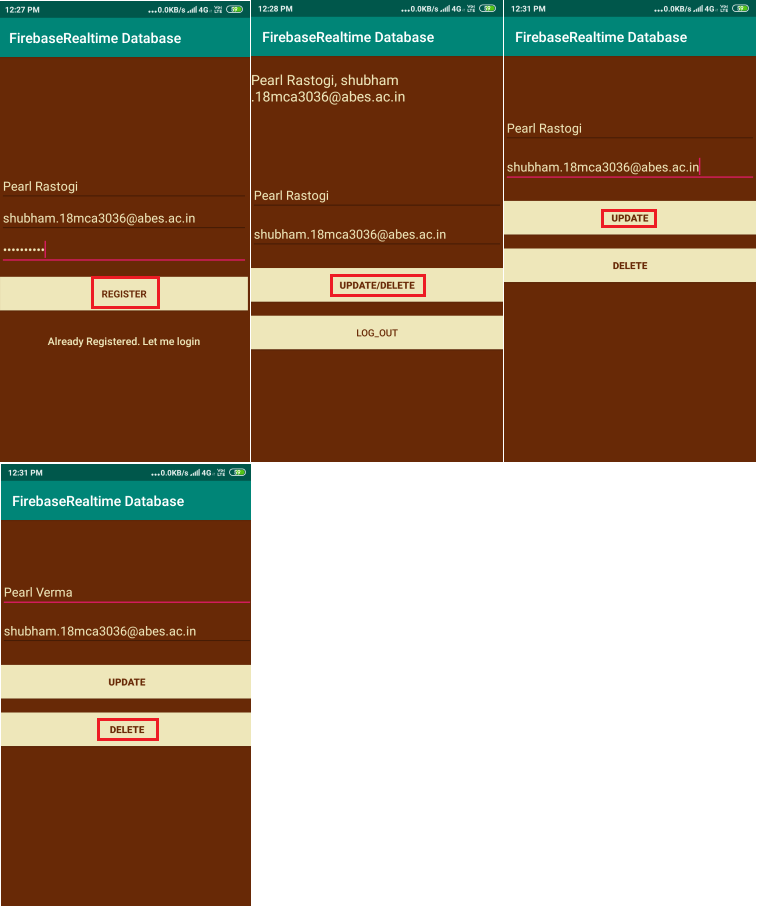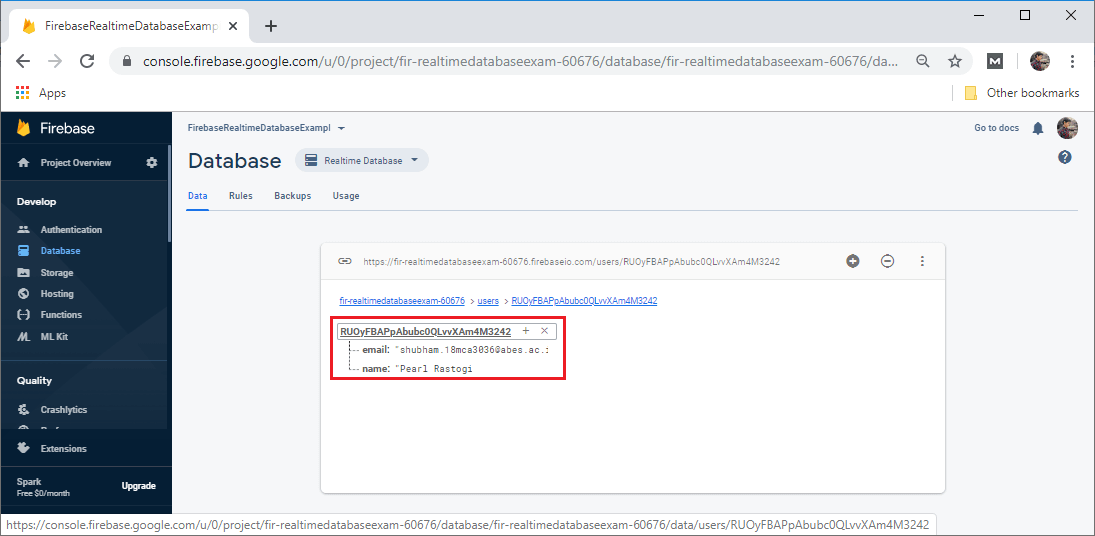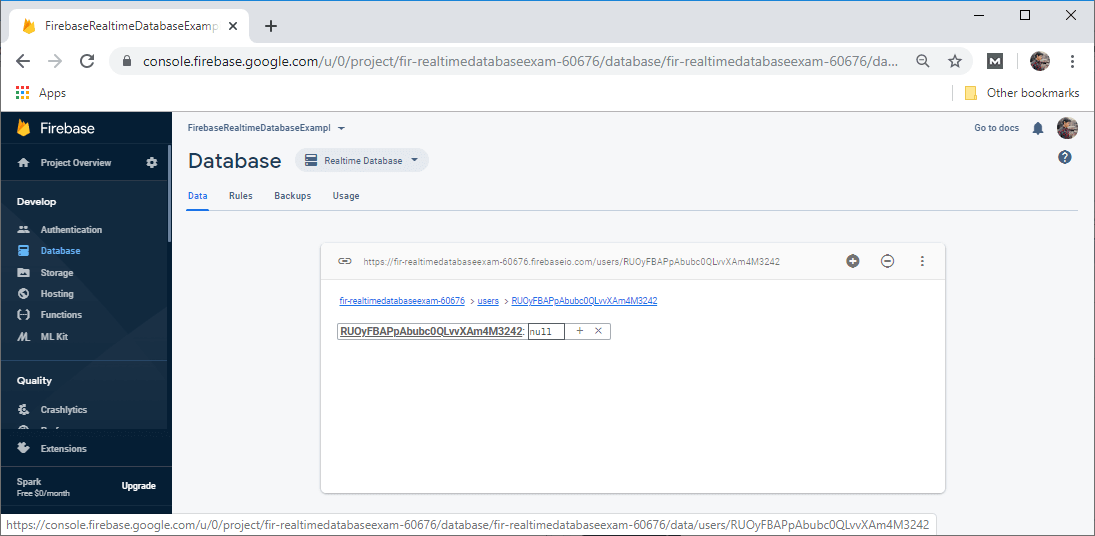- firebase 更新实时数据库 - PHP (1)
- firebase 更新实时数据库 - PHP 代码示例
- 更新firebase实时数据库中的一个键java(1)
- Firebase实时数据库(1)
- Firebase实时数据库
- 更新firebase实时数据库中的一个键java代码示例
- 如何从 Android 中的 Firebase 实时数据库中删除数据?(1)
- 如何从 Android 中的 Firebase 实时数据库中删除数据?
- firebase 实时数据库删除所有数据 - Shell-Bash (1)
- Flutter – Firebase 中的实时数据库
- Flutter – Firebase 中的实时数据库(1)
- 删除 firebase 实时数据库中的多个节点 - Javascript (1)
- firebase 实时数据库删除所有数据 - Shell-Bash 代码示例
- 删除 firebase 实时数据库中的多个节点 - Javascript 代码示例
- firebase 实时数据库删除子项 - Javascript (1)
- Firebase实时数据库设置和配置
- Firebase实时数据库设置和配置(1)
- Firebase 实时数据库与 Android 中的操作示例
- Firebase 实时数据库与 Android 中的操作示例(1)
- firebase 实时数据库删除子项 - Javascript 代码示例
- Firebase | Firestore与实时数据库
- Firebase | Firestore与实时数据库(1)
- firebase 实时数据库增量值 - Javascript 代码示例
- Firebase实时数据库读写
- Firebase实时数据库读写(1)
- cors错误firebase实时数据库-任何(1)
- firebase 实时数据库中的自动增量 - Javascript 代码示例
- firebase 实时数据库基本操作 - Javascript (1)
- cors错误firebase实时数据库-任何代码示例
📅 最后修改于: 2021-01-02 03:38:10 🧑 作者: Mango
Firebase:实时数据库更新和删除
在上一节中,我们学习了如何在数据库中读取和写入数据。现在,我们将学习如何修改和删除数据库中的数据。
更新资料
为了更新JSON数据库中的单个节点,我们只需在正确的子引用上使用setValue()即可。
correct child reference.
myRef.setValue("Hello, World")
myRef.child("someChild").child("name").setValue(name)
如果要写入节点的特定子节点而不覆盖其他子节点,则可以使用updateChildren()方法。当我们调用updateChildren()时,可以通过指定键的路径来更新较低级别的子值。
例如
//writeNewPost function for chat application
private fun Newpost(userId:String, username:String, title:String, body:String){
//creating new post at /user-posts/$userid/$postid simultaneously
//Using push key
val key=database.child("posts").push().key
//Checking it is null or not
if(key==null){
Log.w(TAG,"Could not get push key for posts")
return
}
//Creating Post object
val post=Post(userId, username, title, body)
//Push it to a map
val postValues=post.toMap()
val childUpdates=HashMap()
childUpdates["/posts/$key"]=postValues
childUpdates["/user-posts/$userId/$key"]=postValues
database.updateChildren(childUpdates)
}
push()方法用于在/ posts / $ postid中为所有用户创建包含post的节点中的post,并同时使用getKey()方法检索密钥。然后,该密钥用于在用户帖子/ user-posts / $ userid / $ postid中创建第二个条目。使用/ user-posts / $ userid / $ postid路径,我们可以通过一次调用updateChildren()同时更新到JSON树中的多个位置。以原子方式进行更新意味着所有更新成功或所有更新失败。
添加完成回调
如果我们想知道何时提交数据,则可以添加完成侦听器。 setValue()和updateChildren()都采用可选的完成侦听器。当写入成功提交到数据库后,它将被调用。如果调用失败,则向侦听器传递一个错误对象。此错误对象指示失败发生的原因。
database.child("users").child(userId).setValue(user)
.addOnSuccessListener{
//Write was successful!
//?.
}
.addOnFailureListener{
//Write failed
//?
}
删除
删除数据的最简单方法是在对数据位置的引用上调用removeValue()。我们还可以通过将null指定为另一个写操作(例如setValue()或updateChildren())的值来删除数据。我们可以将此技术与updateChildren()结合使用,以在单个API调用中删除多个子级。
activity_upd_del.xml
upd_del.kt
package com.example.firebaserealtimedatabase
import androidx.appcompat.app.AppCompatActivity
import android.os.Bundle
import android.text.TextUtils
import android.util.Log
import android.view.View
import android.widget.Toast
import com.google.firebase.auth.FirebaseAuth
import com.google.firebase.database.*
import kotlinx.android.synthetic.main.activity_upd_del.*
import kotlinx.android.synthetic.main.activity_welcome.*
import kotlinx.android.synthetic.main.activity_welcome.email
class upd_del : AppCompatActivity() {
private var mFirebaseDatabase: DatabaseReference? = null
private var mFirebaseInstance: FirebaseDatabase? = null
private var userId: String? = null
override fun onCreate(savedInstanceState: Bundle?) {
super.onCreate(savedInstanceState)
setContentView(R.layout.activity_upd_del)
mFirebaseInstance = FirebaseDatabase.getInstance()
// get reference to 'users' node
mFirebaseDatabase = mFirebaseInstance!!.getReference("users")
val user = FirebaseAuth.getInstance().getCurrentUser()
// add it only if it is not saved to database
userId = user?.getUid()
}
private fun updateUser(name: String, email: String) {
// updating the user via child nodes
if (!TextUtils.isEmpty(name) && !TextUtils.isEmpty(email)) {
mFirebaseDatabase!!.child(userId!!).child("name").setValue(name)
mFirebaseDatabase!!.child(userId!!).child("email").setValue(email)
Toast.makeText(applicationContext, "Successfully updated user", Toast.LENGTH_SHORT).show()
}
else
Toast.makeText(applicationContext, "Unable to update user", Toast.LENGTH_SHORT).show()
}
fun onUpdateClicked(view: View) {
val name = name.getText().toString()
val email = email.getText().toString()
//Calling updateUser function
updateUser(name, email)
}
fun onDeleteClicked(view: View) {
//Remove value from child
mFirebaseDatabase!!.child(userId!!).removeValue()
Toast.makeText(applicationContext, "Successfully deleted user", Toast.LENGTH_SHORT).show()
// clear information
txt_user.setText("")
email.setText("")
name.setText("")
}
companion object {
private val TAG = upd_del::class.java.getSimpleName()
}
}
输出量

更新之前

更新后

删除后
